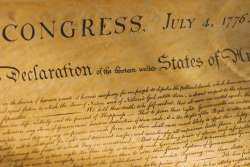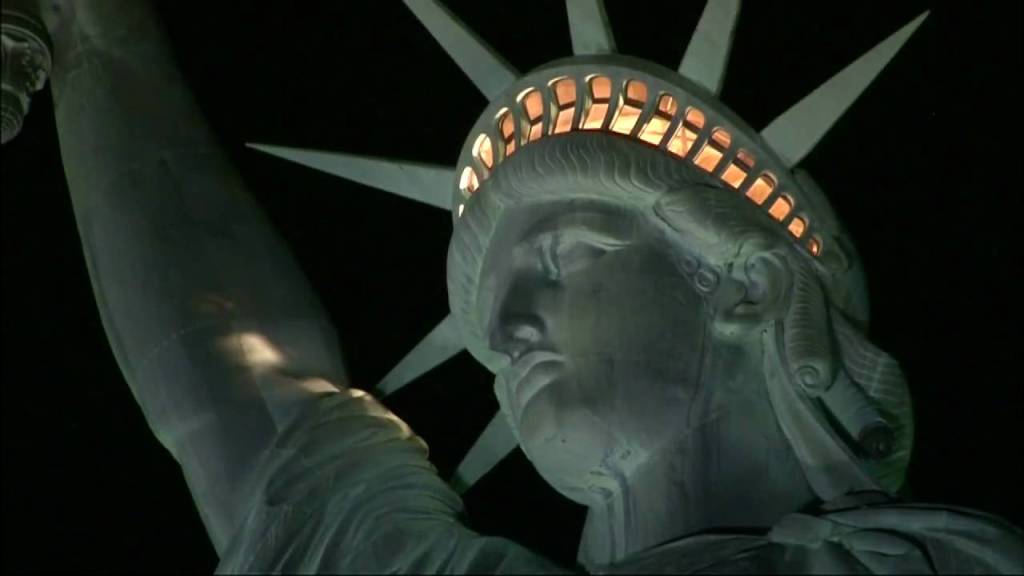Like larger-than-life artists, athletes, scientists, movie stars, and entrepreneurs, the United States of America generates polarized love-hate responses.
The U.S. was born committed to making a new nation based consciously on moral ideals rather than the happenstance of historical evolution: Individuals’ lives are their own to live. They are free to choose their own goals and act to achieve them as they judge best. And the pursuit of their own flourishing and fulfillment is a natural birthright.  All individual’s rights are to be respected equally and a government devised with enough power to protect those rights effectively — but not so powerful as itself to become a threat to those rights.
All individual’s rights are to be respected equally and a government devised with enough power to protect those rights effectively — but not so powerful as itself to become a threat to those rights.
Those moral ideals have inspired multiple generations of Americans and admirers around the world. They have often been realized — as well as often compromised, backtracked upon, and betrayed. Yet in the modern world, its citizens and residents have arguably been the freest, richest, most innovative, tolerant, benevolent, and happiest. And if not the most in all of those aspects, then certainly in the top five for any of them. Let’s argue about the precise rankings.
I’m an immigrant to the USA. While I love the the country of my birth — another great country of moral standards and accomplishment — I also love my adopted country for its achievements, all the while recognizing its historical failings and its ongoing struggles to realize its potential more fully.
Analogy: I feel about the USA the way someone who has chosen their best friend in life wisely feels. You recognize your best friend’s fundamental goodness and excellences and love them for it, while having been there for their screw-ups and knowing well their current self-improvement struggles.
Which brings me to the American-Founding despisers, who I wish would clarify their criticisms, as the rhetoric so often seems out-sized emotionalism and/or strategic deception. My sample may be skewed by the fact that I’m an academic and so spend more time than is healthy reading and listening to their words.  But since they’re academics they can’t be that uninformed. So, is the problem that:
But since they’re academics they can’t be that uninformed. So, is the problem that:
1. the ideals the Founding declared are wrong/bad?
2. the Founding generation did not at that time fully realize the declared ideals — only 95%, 85%, 75%, or so of them?
3. some Founding individuals were wrong/bad — either believing some false things or compromising or being hypocritical — on a major issue, and that issue trumps everything else?
For example:
* Your issue is 3: You actually love American ideals and are only angered at Jefferson or Washington in particular.
* Your issue is 2: You love the ideals but your problem with the Founders is that they didn’t do enough right then and without compromise.
* Your issue is 1: You hate the US’s principles of individual freedom, but you’re attacking, say, Madison’s or Adams’ weaknesses as an indirect way of attacking freedom.
* Or your issue really is 1: You say much about compromises and hypocrisies, but really you’re using their imperfections as a tactical weapon against the ideal of freedom.
By analogy: two married people having an argument about the dirty dishes in the sink. Do they care for each other and their marriage and so it’s really only about some dishes? Or are dishes just a trigger and a coded way of talking divorce?
Just say it already.
As for me, I’m with Thomas Jefferson. From a letter on the 50th anniversary of the Declaration of Independence, expressing this hope for America’s future course:
may it be to the world, what I believe it will be, (to some parts sooner, to others later, but finally to all,) the Signal of arousing men to burst the chains, under which monkish ignorance and superstition had persuaded them to bind themselves, and to assume the blessings & security of self-government. that form which we have substituted, restores the free right to the unbounded exercise of reason and freedom of opinion. all eyes are opened, or opening, to the rights of man. the general spread of the light of science has already laid open to every view. the palpable truth, that the mass of mankind has not been born with saddles on their backs, nor a favored few booted and spurred, ready to ride them legitimately, by the grace of god. these are grounds of hope for others. for ourselves, let the annual return of this day forever refresh our recollections of these rights, and an undiminished devotion to them.
